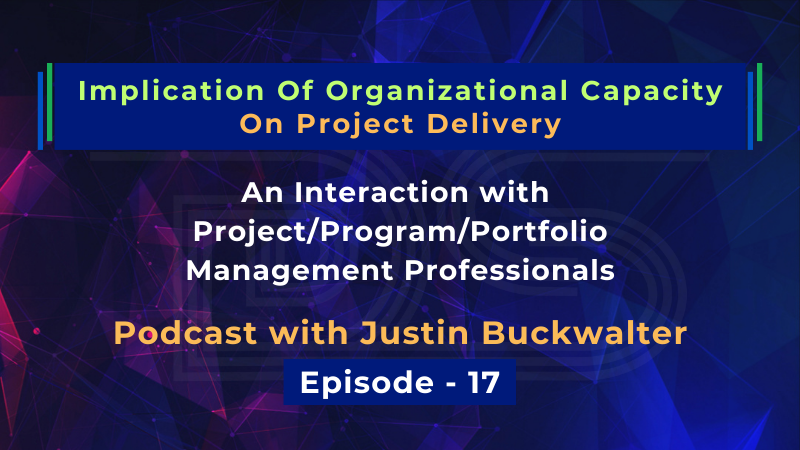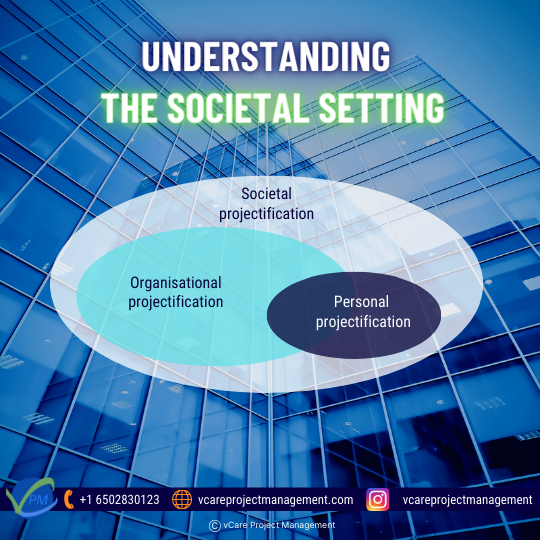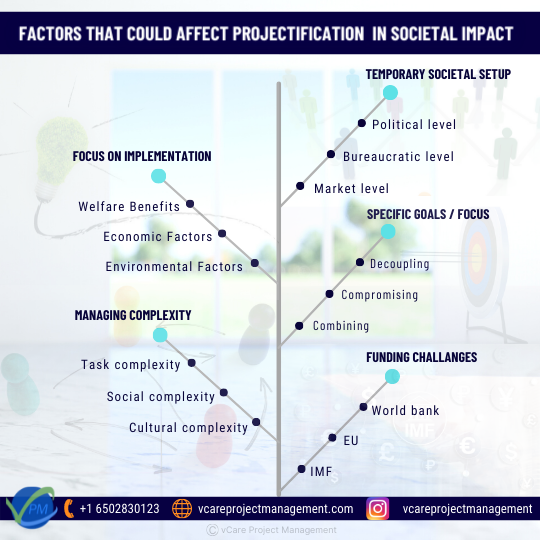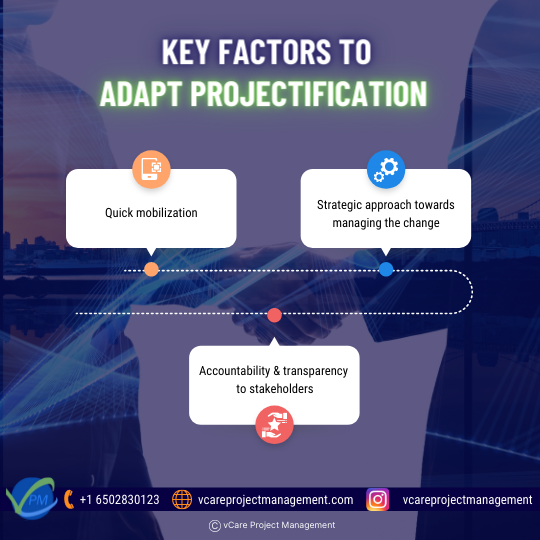
by DharamCW | May 29, 2024 | Program Management
Implication Of Organizational Capacity On Project Delivery | Justin Buckwalter | Dharam | Episode 17
Exploring the critical link between organizational capacity and project success, Episode 17 features insightful discussions on key aspects:
1. How does the scalability of organizational capacity influence project adaptability in dynamic business environments?
2. How can organizational capacity influence project risk assessment and mitigation plans?
3. What strategies enhance an organization’s capacity for handling simultaneous or complex projects, and what unique challenges differentiate managing these projects from others?
4. What challenges arise when scaling project delivery capabilities to meet increasing organizational demands?
5. Discuss the influence of stakeholder engagement and communication on leveraging organizational capacity for project success.
6. How does organizational capacity affect adaptability and responsiveness to changing project requirements or unexpected obstacles?
7. How can organizational capacity be measured and improved to optimize project delivery outcomes?
Stay informed and enhance your project management skills by delving into these crucial insights.
🚀 Seize the opportunity to Elevate Your Project Management Career:
– Register for my upcoming PMI Certification Success Story Webinars: https://bit.ly/4aVhrd6 / https://bit.ly/3QeVhKF
– Book an obligation-free consultation session on Project management Career, training, and certifications: http://talktodharam.com
– Discover training offers and certification discounts: https://bit.ly/3jWVepD
– Stay updated with our Q&A series and certification success stories by subscribing to the vCare Project Management YouTube channel at https://bit.ly/2YF0wJl
– Follow my podcasts and interviews with Project Management Experts on YouTube at https://bit.ly/2NDY8wd

by DharamCW | Mar 29, 2022 | Project-Program-Portfolio Management Knowledge
In the public sector, as Mats Fred (2018, p. 189) indicates:
Projectification as proliferation emphasizes the increasing use and diffusion of projects and project ideas. Projectification as transformation and adaptation highlights the transformation of “permanent” ordinary organizational activities to temporary projects and processes of adaptation in the surrounding organizations and structures. Projectification as an organizational capacity building in which the project logic is spread and diffused in local government organizations, not primarily through specific projects, but through practices encouraging the project logic and reinforcing local government’s organizational project capacity.
The term “Project” itself would be considered as a temporary endeavor. Projectification involves the cultural and discursive societal processes whereby projects and project-like circumstances are institutionalized in individual lives, organizing all sorts of work and society. They are to be planned, controlled, managed with dedication and commitment. In a societal setting, it calls for flexible action and task-focused social relations.
Understanding the Societal Setting

Understanding the Societal Setting
When the boundaries of the project go beyond the organization, societal settings come into place. Societal settings focus on developing and providing solutions together. When the projects are managed and executed at the societal level, it becomes a more collaborative effort. This kind of environment calls for global communication, collective intelligence, identifying skills across the board to leverage. Project execution should focus on accomplishing the tasks by adopting agile principles with empowering the team. The focus should be working through the community via effective networking.
Factors that could affect projectification in societal impact
There could be an influence at a Project Level, Political, Bureaucratic and Market Level. To a varying degree, local government involved in the societal settings would have specific practices that correspond to a political, bureaucratic, and market context. In terms of projectification, there could be complementary or contradictory aspects in nature that need to be managed well. Projectification translation could be done based out on specific settings and practices.
The societal context would have to manage multiple institutions yet need to bring them with a common goal and vision despite indifferences. This aspect needs to be dealt with using Decoupling, Compromising, and Combining depending on the situation and environment. These practices will de-escalate tensions in arriving at a consensus on the focus area or goals.
The project budget needs to be derived from the policies wherein the costs are derived from the social investment funds. This action would mean cutting across the government and local bodies in the region. Sometimes these funds are advocated by World Bank, EU, IMF, etc… Using such funds would also call for strong coordination among the various stakeholders across different processes and procedures. Managing such funds could be tiresome and painful.
Be in the realm of the project in the implementation context. It would look like a smooth sail as initiation would be easy on the ground implementation could be a posing challenge. Focus on the welfare benefits, lower costs for the larger group during the implementation. Understand the potential areas of resistance early in the project upon the various factors including economic, environmental, etc.,
Projectification involves managing an organization to manage two types of complexity involving task complexity and Social complexity. Task complexity refers to the density of the units, causal links, and consequences within a temporal and spatial frame. Social complexity describes the number of members communicating and working with each other and the differentiation of their tasks. In contrast, cultural complexity encompasses the number of different historical experiences and sense-making processes confronting each other in a project.

Factors that could affect projectification in societal impact
The three projectification studies in Germany, Norway, and Iceland show that project work contributes to one-third of the national gross domestic product. Although differences exist among the countries regarding size and industry structure, the degree of projectification of advanced economies seems to converge on around one-third of all economic activities. The exact results showed that the share of project work in Germany was 34,7% in 2013, and 32,6% in Norway, and 27,7% in Iceland in 2014 (Schoper et al., 2018).
The projectification in the public or governance societal segment was more towards improving, modernizing the managerial approach towards the commoner or public. The projects were part of the public sector in the infrastructure area, such as Road Construction, Dam Construction, construction, and larger institutions, and their Projectifications are not sudden. Based on one of the research study by Schuster in 2015, he identified three key factors which seem to provide public/civil service organizations to adopt projectification. They are:
- Quick Mobilization
- Strategic approach towards managing the change
- Accountability and Transparency to stakeholders

Key factors to adopt projectification
It is also to be realized that the ongoing social and economic change and the increase in public sector stakeholder’s innovation and entrepreneurship are most needed in this sector. Projectification helps to meet the void, which can help implement public policies, thus enabling changes in resolving social problems. Even though the benefits exist on projectification, it is not implemented due to the factors such as – Excess bureaucracy, Causes lack of trust, lack of persistence, etc.,
Conclusion
Projectification provides benefits to the people involved to know how to lead a team, influence people, and negotiate or resolve conflict. It would be a combination of more organizing activities to the organizations and transforming ordinary activities into projects. And increasingly, everybody needs to feel comfortable working in a digital environment.
Feel free to check out my discussion on this topic with Reinhard Wagner in YouTube
You can subscribe and follow my podcasts and interviews with Project Management Experts on YouTube at https://bit.ly/2NDY8wd
You can subscribe to vCare Project Management YouTube Channel to catch future videos of our certification Q&A series and student success stories using the link https://bit.ly/2YF0wJl
For any questions related to Project Management career, training, and certifications, you can book an obligation free 15 minutes session with me by visiting talktodharam.com








Recent Comments